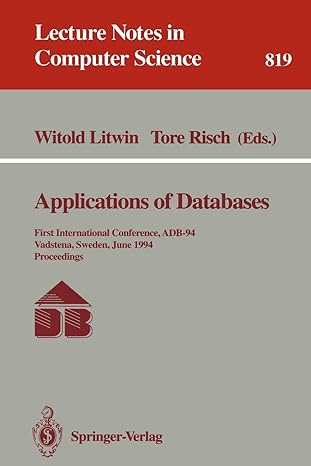Question
Your task is to implement a set data structure in Scheme . A set is an unordered collection of unique elements. Elements may be numbers,
Your task is to implement a set data structure in Scheme.
A set is an unordered collection of unique elements. Elements may be numbers, characters or strings. Elements of a set do not need to have the same type.
You will define the following functions:
(empty? s): return #t if s is an empty set and #f otherwise.
(set s): return a list representation of a set where each element appears once. The order is not relevant.
(in? e s): return #t if the element e is in the set s, #f otherwise.
(add e s): return a new set that contains all the elements in s and the element e.
(discard e s): return a new set that contains all the elements in s other than e. If e is not in s, discard returns s.
(union s1 s2): return a new set that contains all the elements in s1 and all the elements of s2. The new set does not contain duplicates.
(intersection s1 s2): return a new set that contains all the elements that appear in both sets.
(difference s1 s2): return a new set that contains all the elements in s1 that are not in s2.
(symmetric-difference s1 s2): return a new set with elements in either s1 or s2 but not both.
(subset? s1 s2): return #t if every element of s1 is in s2, #f otherwise.
(superset? s1 s2): return #t if every element of s2 is in s1, #f otherwise.
(disjoint? s1 s2): return #t if s1 and s2 have no elements in common, #f otherwise.
(sameset? s1 s2): return #t if s1 and s2 have the same elements, #f otherwise. The order is not relevant.
A racket definition template that includes some test code is available for your convenience: sets.rkt
SETS.RKT CODE:
(define (empty? s) 'enter-your-code-here )
(define (set s) 'enter-your-code-here )
(define (in? e s) 'enter-your-code-here )
(define (add e s) 'enter-your-code-here )
(define (discard e s) 'enter-your-code-here )
(define (union s1 s2) 'enter-your-code-here )
(define (intersection s1 s2) 'enter-your-code-here )
(define (difference s1 s2) 'enter-your-code-here )
(define (symmetric-difference s1 s2) 'enter-your-code-here )
(define (subset? s1 s2) 'enter-your-code-here ) (define (superset? s1 s2) 'enter-your-code-here )
(define (disjoint? s1 s2) 'enter-your-code-here )
(define (sameset? s1 s2) 'enter-your-code-here )
SOME TESTS:
(define A (set '(1 2 7 9 7 1))) (define B (set '(2 0 8 0 7 12))) (define C (set '(9 7)))
(define colors (set '("yellow" "red" "green" "blue" "orange" "purple" "pink"))) (define rgb (set '("red" "green" "blue")))
(define hi (set '(#\h #\i)))
(isempty? A) ; #f (isempty? rgb) ;#f (isempty? (set'())) ;#t
(isin? 0 A) ; #f (isin? "red" A); #f (isin? 2 A) ; #t
(isin? "green" rgb) ; #t (isin? "purple" rgb) ; #f (isin? "i" hi) ;#f (isin? #\i hi) ;#t
(add 9 A) ; (2 9 7 1) (add 5 A) ; (5 2 9 7 1)
(discard 1 A) ; (2 9 7) (discard 5 A) ; (2 9 7 1) (union A B) ; (9 1 2 8 0 7 12) (union A rgb) ; (2 9 7 1 "red" "green" "blue")
(intersection A rgb) ; () (intersection A B) ; (2 7) (intersection rgb colors) ; ("red" "green" "blue")
(difference A B) ; (9 1) (difference rgb colors) ; () (difference colors rgb) ; ("yellow" "orange" "purple" "pink")
(symmetric-difference A B) ; (9 1 8 0 12) (symmetric-difference A C) ; (2 1) (symmetric-difference colors rgb) ; ("yellow" "orange" "purple" "pink")
(issubset? A B) ;#f (issubset? C A) ; #t
(issubset? colors rgb) ;#f (issubset? rgb colors) ; #t
(issuperset? A B) ;#f (issuperset? A C) ; #t
(issuperset? colors rgb) ;#t (issuperset? rgb colors) ; #f
(isdisjoint? B C) ;#f (isdisjoint? colors A) ;#t
(issameset? (set '(9 1 2 7)) A); #t (issameset? B A) ; #f
Step by Step Solution
There are 3 Steps involved in it
Step: 1

Get Instant Access to Expert-Tailored Solutions
See step-by-step solutions with expert insights and AI powered tools for academic success
Step: 2

Step: 3

Ace Your Homework with AI
Get the answers you need in no time with our AI-driven, step-by-step assistance
Get Started


